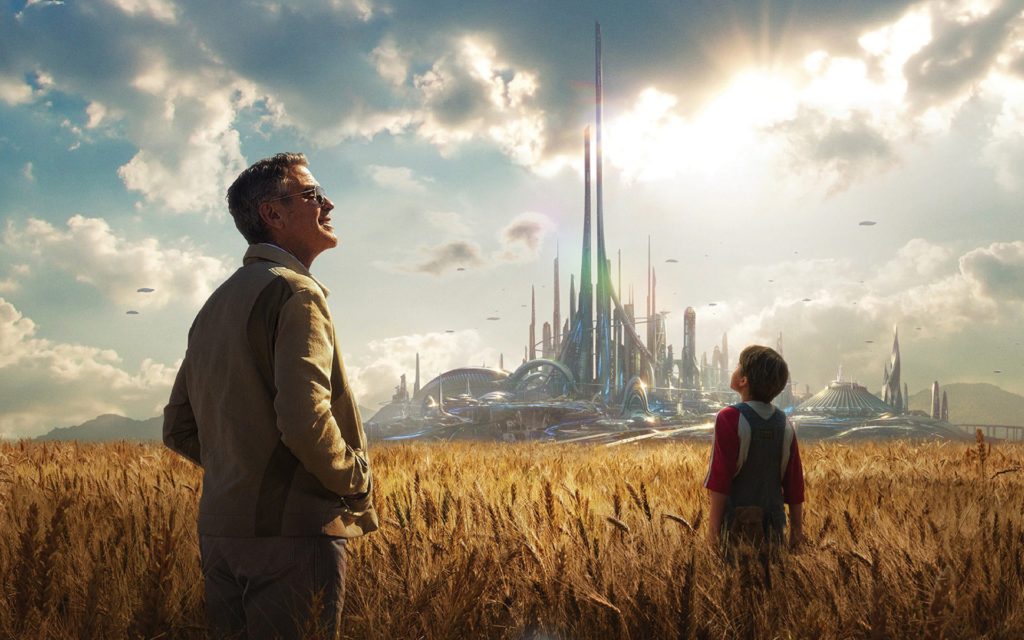Summer Movie Series
Tomorrowland (2015)
Rated PG

Disney Pictures
Tomorrowland is the kind of movie that would have inspired me as a kid. Nearly every moment of this film’s runtime is devoted to underscoring the power and necessity of imagination and invention. That our fertile human minds can lead us not only to weapons of destruction and instruments of healing but to a more essential purpose, as thinking beings, of our capacity to shape our destiny in the best of ways. I’m proud to write that as an adult I found this movie inspiring. In this era of bloated politics, cultural indifference, incuriousness and xenophobia, I tapped into the filmmakers’ schema that a through-line of invention is always among the clutter, a path waiting to be exposed and taken. It’s as if the movie is a test of our belief in our better angels, the power of imagination. Those who cotton to that may be moved by the film’s attempts to inspire; those who don’t may dismiss this as corny.
 When we think of the imagination it took to allow man to travel beyond the planet and walk on the surface of the moon, or even imagining a day when it would be commonplace for men, women and children to board a pressurized tube of aluminum and plastic to be hurled hundreds of miles and hour, tens of thousands of feet about the ground as a form of commercialized travel, how did we get to a time and place where that kind of ingenuity is buried under the latest political wrangling or financial scandals or reality-TV obsession? We don’t invent things anymore, we stand on the shoulders of inventions we now mock, while repackage them in the latest colors, slim shapes and hipster slogans.
When we think of the imagination it took to allow man to travel beyond the planet and walk on the surface of the moon, or even imagining a day when it would be commonplace for men, women and children to board a pressurized tube of aluminum and plastic to be hurled hundreds of miles and hour, tens of thousands of feet about the ground as a form of commercialized travel, how did we get to a time and place where that kind of ingenuity is buried under the latest political wrangling or financial scandals or reality-TV obsession? We don’t invent things anymore, we stand on the shoulders of inventions we now mock, while repackage them in the latest colors, slim shapes and hipster slogans.
Imagination and those who celebrate it are often punchlines these days. And yet from our earliest imaginings we’ve created motion pictures and automobiles and computers and microwave ovens and antibiotics and x-ray machines.
Tomorrowland presupposes that most of us have grown up and away from ideas of awe and visions that stir us to move in wonderfully radical directions. We’re resigned to our fate of future days that will erase, decade upon decade, our joy of possibilities and possible better times. Who today looks ahead and envisions days of abundant resources and peaceful cultures and cooperative nations? But what of this mythical place where the imagination could be allowed to run free? The story jumps off at New York’s 1964 World’s Fair, where we meet the best, brightest, boldest thinkers and imaginers.
One such thinker, 10-year-old Frank Walker with his self-made jetpack (of course!) in tow, will attend the fair with the intention of changing the world with its possibilities. While a fair official (Hugh Laurie) sees promise in Frank but dismisses the boy as not yet ready for prime time, a curious little girl, Athena (Raffey Cassidy), thinks otherwise, seeing something urgent in Frank’s imagination. The boy is surreptitiously invited to a world beyond the world he thinks he knows. This prologue gives us a marvelous glimpse of Tomorrowland—a gleaming, Disney Kingdom-like wonderland of rockets and flying trains and inventions as small as a button pin and as large as the sky—before we’re catapulted to the present day where we meet Casey (Britt Robertson), a wise-beyond-her-20 years daughter of a NASA scientist (Tim McGraw). Casey, already a dreamer, makes a spectacular and brief visit to Tomorrowland and doesn’t hesitate to chase its possibilities. This puts her in the sights of powerful forces who’d rather not have the place discovered and will use deadly means to keep things secret.
She eventually connects with a much older, disillusioned Frank (George Clooney) who has long put his residency of Tomorrowland behind him, as well as, perhaps, the promise he once held as a boy. Clooney does wonderful work as the craggy, jilted Frank who nevertheless maintains a little-boy longing in his eyes. It’s great to see Casey’s imagination reignite his.
Casey’s plight aligns her with Frank and a still-young Athena as Casey uncovers not just the wonders of the future, but, as grownups know, its frightening uncertainties as well. The stakes—at first the exposure of Tomorrowland, then the possible end of the real world itself—felt like serious business to me. But don’t let my crowing about the film’s underpinnings make you think there’s no fun to be had. There are great action set pieces, including giant robots fighting, a time-freezing weapon, a journey into space and through a wormhole, an attack on a country house decked out with a most impressive defense system, and a fight that takes place in two time streams.
What does it say about a film that gambles its success on the hopes that the audience buys into a dream? It saddens me to see this film turn out low box office numbers and negative reviews, basically making the film’s point of humanity’s time-worn nature to run headlong into cynicism and doubt, instead of it daring to dream, to believe that better, yet-to-be-imagined days lie ahead.
No matter. I was inspired and I hope younger viewers, who are our tomorrows, will be as well. I found the last shot of the film powerful. Does that make me a sap, or hopelessly optimistic?

| Marvin Brown’s Movie Review Archive
Social tagging: blog > bloghouse > Brad Bird > Britt Robertson > Disney > film > George Clooney > Hugh Laurie > Marvin Brown > Movie > NASA > Raffey Cassidy > review > Tim McGraw > Tomorrowland




